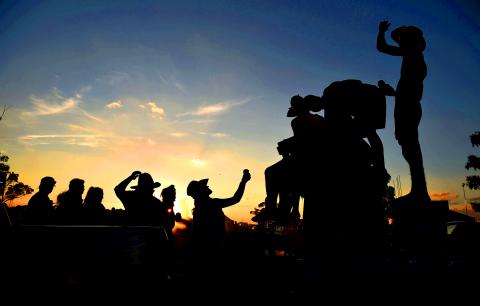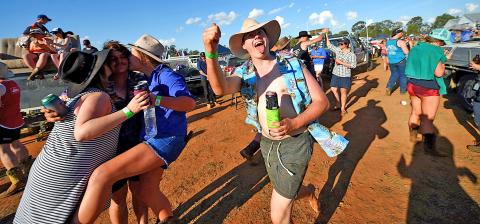Pick-up trucks, cowboy boots and a 24-hour booze-fueled party in the Outback: welcome to modern-day dating in Australia’s bush, where swiping right is not an option.
For single men and women on remote farms or in tiny villages, “Bachelor and Spinster” balls offer a better chance of finding love than dating apps like Tinder.
The balls, a decades-old tradition in outback Australia, still attract thousands of young adults looking for love — or to get rolling drunk.

Photo: AFP/Peter Parks
“It’s very old-school,” Emily Pitt, a 24-year-old from the former gold rush town of Gulgong, tells AFP.
“It’s how country singles meet each other because you’re rural and there’s hundreds of kilometers between you.”
Surrounded by vast tracts of wheat and canola, Ariah Park, some 400km west of Sydney, is better known for grain-growing than big parties.

Photo: AFP/Peter Parks
It has a population of just 500 and the main street — with its row of historic buildings with wide verandahs — looks preserved in time.
But on the last Saturday of October the usually peaceful village is inundated with pick-up trucks, which roar up to a dried-out paddock to deposit partygoers.
About 1,500 people showed up for this year’s outdoor drinking and dancing extravaganza, the second-biggest turnout in the event’s 32-year history.
While the ball has a black-tie dress code, the warm-up party is a casual affair, with people wearing scruffy T-shirts, shorts and flip flops and drinking heavily.
“It’s just fun, you meet people, you drink, you party,” says five-time B&S partygoer Claudia Bailey, who traveled more than 200km to attend the celebration.
“We got here Friday night and haven’t slept yet so it’s just completely different, nothing like clubbing or anything. It’s just a different vibe,” the 21-year-old says.
When night falls partygoers change into their formal attire and pack into a marquee where they stomp their boots and toss their cowboy hats into the air as they dance to country rock tunes belted out by live bands.
‘DRUNK AND DISORDERLY’
The balls are notorious for binge drinking, casual sex and dangerous driving antics, and safety is a perennial concern for organizers.
Ariah Park revelers get unlimited alcohol for their Aus$120 (US$92) entry ticket and a goody bag that includes a plastic beer cup and a condom.
Pre-ball entertainment once featured pick-up trucks — utility vehicles known as “utes” in Australia — tearing up the paddock in ear-splitting “circle work.”
That’s now banned but “key banging” — making a vehicle backfire — has taken center stage. Across the showground, deafening pops shatter the air.
“Mine is pretty loud, it’s pretty good, I get flames every time I do it pretty much. I get wedding proposals, I get people asking to marry me when I do it,” says Mandy Mannington, 22, from the nearby town of Marrar.
One man adds to the merriment by driving a sit-on lawn mower around in circles as smoke belches from its two vertical exhaust pipes, attracting loud cheers from onlookers.
Another reveler strolls past holding a long walking stick fashioned out of empty rum cans strapped together with duct tape, drawing shouts of “Gandalf!”
B&S regular Jack Beehag from Sydney says he likes the easy-going atmosphere of the balls.
“You just go up and talk to anyone really,” the 20-year-old says, noting the big difference to the dating apps popular in the city that allow people to chat online.
“Everyone gets along here better.”
‘LET THEIR HAIR DOWN’
Medics are on standby to treat the inevitable injuries.
“Today already somebody’s had a bit too much to drink and fallen off a ute and had a bit of a head injury... you get everything like people falling over, rolling their ankles, hurting their back or what not,” paramedic Aaron Savidge says.
As the festivities continue and inebriation levels rise, pick-up trucks turn into makeshift camps with many amorous attendees enticing someone back to their swag, an Australian-style bedroll, to spend the night.
“They used to have a sit-down dinner, strictly black tie and closed shoes,” says organizer Ned Fisher, referring to B&S balls of the past.
“Now it’s a modern sort of thing where it’s just more of a bit of a party... People just come here and have a good time and meet new people and just really let their hair down.”

Desperate dads meet in car parks to exchange packets; exhausted parents slip it into their kids’ drinks; families wait months for prescriptions buy it “off label.” But is it worth the risk? “The first time I gave him a gummy, I thought, ‘Oh my God, have I killed him?’ He just passed out in front of the TV. That never happens.” Jen remembers giving her son, David, six, melatonin to help him sleep. She got them from a friend, a pediatrician who gave them to her own child. “It was sort of hilarious. She had half a tub of gummies,

June 23 to June 29 After capturing the walled city of Hsinchu on June 22, 1895, the Japanese hoped to quickly push south and seize control of Taiwan’s entire west coast — but their advance was stalled for more than a month. Not only did local Hakka fighters continue to cause them headaches, resistance forces even attempted to retake the city three times. “We had planned to occupy Anping (Tainan) and Takao (Kaohsiung) as soon as possible, but ever since we took Hsinchu, nearby bandits proclaiming to be ‘righteous people’ (義民) have been destroying train tracks and electrical cables, and gathering in villages

The wide-screen spectacle of Formula One gets a gleaming, rip-roaring workout in Joseph Kosinski’s F1, a fine-tuned machine of a movie that, in its most riveting racing scenes, approaches a kind of high-speed splendor. Kosinski, who last endeavored to put moviegoers in the seat of a fighter jet in Top Gun: Maverick, has moved to the open cockpits of Formula One with much the same affection, if not outright need, for speed. A lot of the same team is back. Jerry Bruckheimer produces. Ehren Kruger, a co-writer on Maverick, takes sole credit here. Hans Zimmer, a co-composer previously, supplies the thumping

Swooping low over the banks of a Nile River tributary, an aid flight run by retired American military officers released a stream of food-stuffed sacks over a town emptied by fighting in South Sudan, a country wracked by conflict. Last week’s air drop was the latest in a controversial development — private contracting firms led by former US intelligence officers and military veterans delivering aid to some of the world’s deadliest conflict zones, in operations organized with governments that are combatants in the conflicts. The moves are roiling the global aid community, which warns of a more militarized, politicized and profit-seeking trend